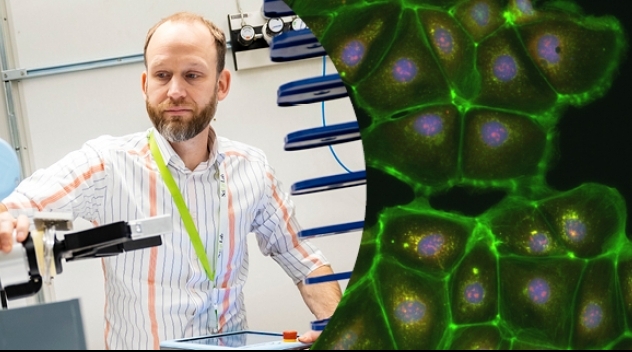Robotised laboratory new resource in Swedish pharmaceutical research
With the recruitment of Ola Spjuth's research environment for Pharmaceutical bioinformatics, the national infrastructure Chemical Biology Consortium Sweden establishes a node at Uppsala University. The initiative is a new important step in the ongoing implementation of Artificial Intelligence in Swedish life science.
The Chemical Biology Consortium Sweden (CBCS) is a national infrastructure for research in Chemical Biology. With headquarters at SciLifeLab and nodes at selected leading laboratories, CBCS provides technology and expertise for the development and utilisation of small molecules. Following the launch in 2010, the platform has established itself among the key resources for Swedish pharmaceutical research, and is now taking the next step by recruiting the Faculty of Pharmacy's research environment for Pharmaceutical bioinformatics.
“CBCS has identified an increasing need for project support in Artificial Intelligence and data analysis, and with five years funding from the Swedish Research Council, our team is now joining the platform to offer our competencies in this field. The fact that CBCS is now represented at Uppsala University also adds important values, creating contact areas between our researchers and the services provided by the infrastructure,” says Ola Spjuth, Professor of Pharmaceutical Bioinformatics.
Ola Spjuth's team will, among other things, contribute services for large scale cell profiling (Cell Painting), where they with the use of microscopy will map how different types of cells react when exposed to substances. This work will be performed in the group's robotised laboratory, inaugurated earlier this year. This is a resource that enables automated processes and efficient analyses of the comprehensive and complex data generated during each study.
“Our efforts will primarily focus on profiling substances, to explain how they interact with different cell types and predict potential side effects. Each individual project will include up to hundreds of thousands of high-resolution images. They are challenging to analyse, and machine learning is a method that has shown to be very powerful for these types of applications. The fact that we have built our own laboratory gives us a unique flexibility, and we are convinced that we can provide great values when we start taking on projects via CBCS,” says Ola Spjuth.
The CBCS infrastructure has been a success factor in a number of scientific publications in highly ranked journals, several patents and – so far – six new companies. The platform's assignments include managing and distributing SciLifeLab's collections of more than 200,000 small molecules. These constitute an important resource in the study and identification of organic molecules with the capacity to influence biological systems in a desired direction.
“We will also perform large-scale phenotypic screenings of different cell models using or methodology. These can be rather large undertakings, but the Swedish Research Council's long-term investments in our environment is providing us room to recruit the employees we need to add an extra dimension to chemical biological research in Sweden,” says Ola Spjuth.
Magnus Alsne
Facts CBCS
- Offers project support in Assay Development, Small Molecule Screening, Medicinal and Synthetic Chemistry etc.
- Has from 2022 nodes at Uppsala University, Karolinska Institutet, Linköping University, Lund University, Umeå University and University of Gothenburg.
- Is a platform at SciLifeLab since 2013.

